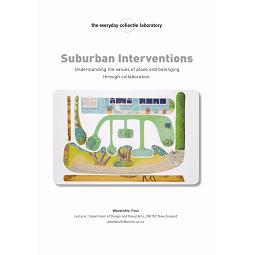 How can a socially defined project facilitate meaningful knowledge transfer between community, corporate, and institution? In order to address this question, this paper focuses on an ongoing live project in suburban Auckland New Zealand began in 2010, undertaken by a post-graduate student and researcher collective. The collective currently creates subtle interventions sited within local cyberspace, and through this current project will employ impermanent and small-scale design to advocate for a series of neglected and disputed sites. It explores the impact and value the presence of artists and designers working within local
How can a socially defined project facilitate meaningful knowledge transfer between community, corporate, and institution? In order to address this question, this paper focuses on an ongoing live project in suburban Auckland New Zealand began in 2010, undertaken by a post-graduate student and researcher collective. The collective currently creates subtle interventions sited within local cyberspace, and through this current project will employ impermanent and small-scale design to advocate for a series of neglected and disputed sites. It explores the impact and value the presence of artists and designers working within local
communities can have, and “champions the role of the artist in the development of the
public realm, and their intuitive response to spaces, places, people and wildlife” (Wood
2009, p.26). The significance of this project is that it promotes a collaborative and multidisciplinary methodology that works with community groups to advocate to corporate entities for a wider social and environmental awareness of specific sites. This paper aims to explain the processes and findings of the project to date through both its successes and failures. It also proposes the possibility of the methodology being transferred to undergraduate and post-graduate study as a tool to promote multi-disciplined collaborate project briefs that focus on community well being.